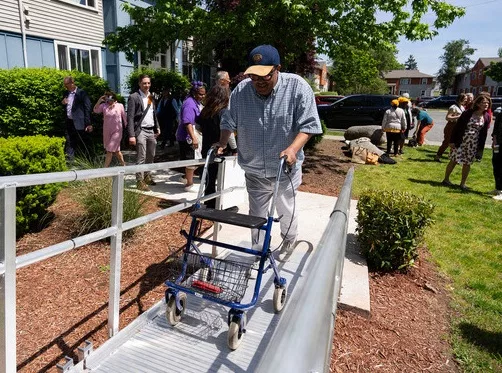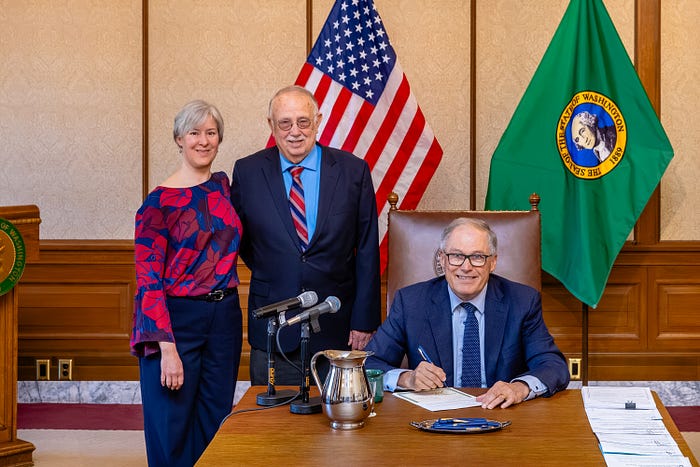
SEATTLE, WA – The WA Cares Fund, Washington’s new long-term care insurance program, launched last year. Seven in 10 Americans will require long-term care at some point, and WA Cares provides flexible benefits that workers can use if they have an illness, accident, or other need for care later in life.
Legislators improved the program this session by making WA Cares benefits portable. Now, Washingtonians who paid into WA Cares can still benefit should they move away.
Beginning in July 2026, Washington workers can continue to participate in the WA Cares Fund if they move out of state. Workers who paid in for at least three years of 500 hours worked may opt into out-of-state coverage within a year of leaving.
Like in-state workers, out-of-state participants will keep contributing to the fund during their working years. Benefits will become available to out-of-state participants who need care starting in July 2030.
Gov. Jay Inslee signed HB 2467 on March 15 this year to approve portability.
“This is a big deal,” said advocate Kate White Tudor after Inslee signed the bill. “It IS a big deal,” replied the governor.
During a meeting this week, Arielle Finney, WA Cares Fund Policy and Rules Manager, talked about issues with internet access for rural residents.
“Washington is a state that cares for people. We lead the nation on worker protections, paid leave, and now long-term care insurance,” said Gov. Jay Inslee. “WA Cares is there for people when they start to need help with daily functions. And now that we’ve approved portability, your benefits are there for you even if you’re not here in Washington anymore. This is a great program made better this session.”

From Governor’s Office:
Flexible benefits
WA Cares benefits are designed to help you live independently for longer. Should you start to need a walker to get around, WA Cares can help with that. If you need to build a ramp or make your home more accessible, it can help with that, too. WA Cares benefits are flexible, covering a variety of important care needs.
The program covers home care and residential long-term care. It covers food delivery, transportation to medical appointments, assistive equipment, care supplies, and more. Your WA Cares benefit can even be used to pay a family member caring for you.

Marcos Worku was a nurse when he experienced a stroke at age 47. He suffered brain damage and mobility loss in his hands and legs. He recuperated in a nursing home for five years, slowly regaining his strength. He’s finally able to live independently again, but he needs a little help. His home care aide comes by a few hours each week to make meals and help around the house. A new ramp out front helps him come and go with his walker.
“As a home care aide, I come by twice a week for a few hours to help Markos with things like getting dressed and bathed, and getting his meals and medications — support so he can continue living at home, where he wants to be,” said Sonja Thomas, a certified home care aide. “Washington’s long term care benefit is going to make it possible for millions of us to get the help we need to stay in our own homes just like Markos is doing today.”
The WA Cares benefit would help a lot in situations like Worku’s. The program isn’t just for those over 65; it’s generally open to people who need support to live independently. Unlike Medicaid, you don’t need to spend down your savings to benefit.

WA Cares beats private insurance
Private long-term care insurance is hardly common. Only 3% of Americans are covered. And private insurers routinely raise premiums, deny benefits, and disqualify customers for conditions as benign as sleep apnea.
“As a healthy, fit person and former competitive rower, I was shocked to be rejected for private long term care insurance due to a pre-existing condition from my childhood,” said Kim Allen, a patient advocate with UW Medicine. “I am proud to live in a state that is providing support and services that most of us will need at some point in our lives.”
WA Cares’ value is unbeatable: anyone making less than about $210,000 will earn more in benefits than they pay in over a 30-year career. The typical worker will contribute an average of $8,716 in total over 30 years of work for a flexible $36,500 benefit. That amount will also adjust with inflation. In 20 years, the benefit may reach $60,000. And the benefit is reliable: you will not be disqualified for underlying conditions. Rather, the program is meant to help you get the care you need when inevitable health issues arise.
With flexible benefits, stable eligibility, and significant return on investment, WA Cares is superior to unaffordable private insurance.
The ‘Silver Tsunami’
The American population is older than ever — and getting older. By 2050, one in four Americans will be sexagenarians. The number of people with Alzheimer’s disease is growing. Rates of obesity, heart disease, and liver disease have increased. The share of older adults living alone is growing.
These older adults are also bringing less into retirement. A 2015 report found that over half of households nationwide approaching 65 had less than $25,000 in retirement savings. According to a Department of Commerce study, 41% of Washington workers near retirement have no projected retirement income and another 42% only have enough savings to replace a tenth of their pre-retirement income.
The fact is that America is aging. Older adults will need care, and they’ll need help to pay for it.
“WA Cares is a pragmatic, modest step towards addressing the crisis that we all agree is a big problem,” WA Cares program director Ben Veghte told the Washington State Standard last November.
“And I think we need to enhance it, build on it and flank it with other things. WA Cares is an essential first step towards reducing the magnitude of this challenge that all of us are going to be facing in the coming decades.”


